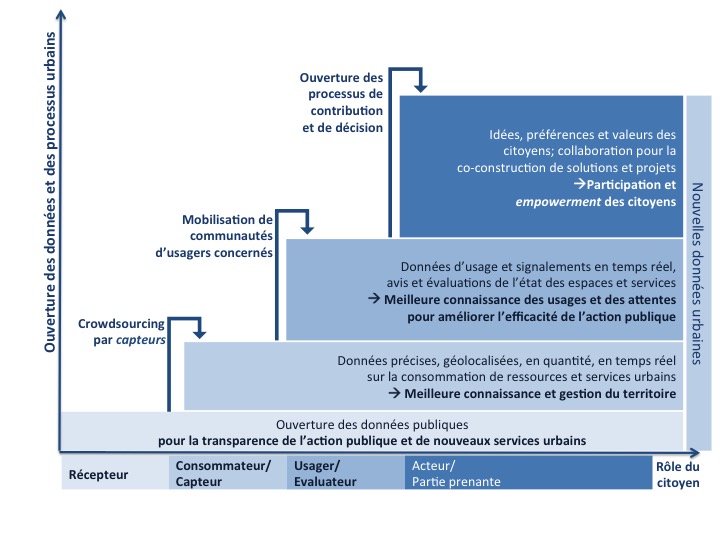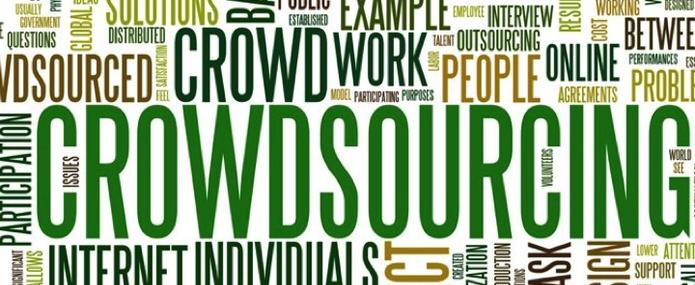Digital crowdsourcing tools enable citizens to contribute to the urban fabric by producing data, opinions and ideas about their city. Consistent with a collaborative approach, they help to obtain better solutions and to get citizens involved in public life. Can these tools be used to develop and implement a sustainable city project? Under which conditions?
Crowdsourcing is based on a simple idea: using digital technologies to collect and organise contributions from a crowd of “non-professional” individuals and to thereby obtain innovative solutions or products. Initially recognised for its inclusion in a new “Age of the multitude” and in debates about this “collaborative” economy that is disrupting the global economy by turning consumers into contributors who network through platforms (Amazon, Facebook), crowdsourcing is also embodied in emblematic examples such as Wikipedia or OpenStreetMap.
Crowdsourcing is now the subject of numerous experiments in French cities and abroad. Engaging citizens in order to produce new information about their city, increasing knowledge about uses and collectively proposing solutions and projects: this is the threefold promise of urban crowdsourcing tools. From tools for reporting problems in public spaces () to participatory budgeting (rehabilitation of the Petite Ceinture disused railway in Paris) and initiatives involving inventories (biodiversity inventory), mapping or evaluations of areas and infrastructure (cycling), citizens are being called upon to provide their expertise in order to improve city management and design.
The authorities also use crowdsourcing with a view to transforming public action, in order to respond to requests for evaluation and to demonstrate the effectiveness of their action. Digital tools help to build new channels for dialogue and interaction between the authorities and citizens: FixMyStreet can be used to report problems to the authorities and to track their resolution.
Finally, a new “participatory imperative” explains the use of digital tools to request and address “expert” contributions from citizens, while providing new opportunities for re-engaging citizens expressing disaffection with politics: idée.paris.fr thus invites citizens to contribute to proposing and choosing new city projects. Figure 1. Transforming the urban fabric through crowdsourcing. From citizen-sensors to the co-construction of urban projects
Figure 1. Transforming the urban fabric through crowdsourcing. From citizen-sensors to the co-construction of urban projects
These three levels, or three approaches to the role of citizens, can be combined to produce a new way of building cities based on the exchange of data. With crowdsourcing, raising awareness about cities and better co-producing them can and must go hand in hand, enabling a form of engagement that supplements the more traditional forms of participation (voting, face-to-face participatory mechanisms , and associations). A new virtual public space, which is useful for sustainable urban development, can be invented.
This can only be achieved under certain conditions. Digital literacy training should be a priority to ensure nobody is left out of this movement. Moreover, the local authorities must go beyond simply modernising traditional channels of information and interaction, in order to truly acknowledge and utilise citizens’ expertise. They will also need to mobilise user communities, giving them assurances about the impact of their involvement, or even remunerating them. Finally, cities will need to ensure horizontal articulation of their strategies on digital technologies, citizen participation and sustainable development with a view to achieving an open democracy.
Beyond crowdsourcing, the challenge is to consider cities as the common good of their inhabitants. Transparency and open data therefore seem essential: crowdsourcing tools and their outcomes would benefit from being organised according to the common good models tested by the digital revolution, in order to truly progress towards the Wikicity!
Further reading: >> Le « crowdsourcing urbain » pour transformer la fabrique de la ville [IB N°06/2016. IDDRI, 2016. 4 P. >> IDDRI organised the conference “Sustainable development 2.0 – Can digital technologies fuel the ecological transition?” on 23 June 2016 – Click here for more information
Crowdsourcing is now the subject of numerous experiments in French cities and abroad. Engaging citizens in order to produce new information about their city, increasing knowledge about uses and collectively proposing solutions and projects: this is the threefold promise of urban crowdsourcing tools. From tools for reporting problems in public spaces () to participatory budgeting (rehabilitation of the Petite Ceinture disused railway in Paris) and initiatives involving inventories (biodiversity inventory), mapping or evaluations of areas and infrastructure (cycling), citizens are being called upon to provide their expertise in order to improve city management and design.
How can crowdsourcing transform cities?
First, crowdsourcing provides an alternative to the purely technical approach to optimisation of “smart cities” managed by sensors and algorithms. This model has shown its limits in terms of steering lifestyles towards greater sustainability, whereas crowdsourcing puts citizens back at the heart of the digital revolution and proposes a combination of technological innovations and new social practices in cities.The authorities also use crowdsourcing with a view to transforming public action, in order to respond to requests for evaluation and to demonstrate the effectiveness of their action. Digital tools help to build new channels for dialogue and interaction between the authorities and citizens: FixMyStreet can be used to report problems to the authorities and to track their resolution.
Finally, a new “participatory imperative” explains the use of digital tools to request and address “expert” contributions from citizens, while providing new opportunities for re-engaging citizens expressing disaffection with politics: idée.paris.fr thus invites citizens to contribute to proposing and choosing new city projects.
 Figure 1. Transforming the urban fabric through crowdsourcing. From citizen-sensors to the co-construction of urban projects
Figure 1. Transforming the urban fabric through crowdsourcing. From citizen-sensors to the co-construction of urban projects
The different crowdsourcing tools can contribute to sustainable urban development on three levels:
- the production of richer, real time and more detailed data may facilitate the optimisation and management of urban services and thereby potentially improve their environmental efficiency. This may depend on relatively passive contributions from citizens, considered as consumers/sensors (e.g. using GPS tracking to organise road systems);
- the production of user feedback, opinions and evaluations can help to better adjust infrastructure and urban services to the practices and behaviour of locals. For example, we see that energy efficiency projects in buildings often encounter a mismatch between the technical systems chosen and residents’ lifestyles, to the detriment of environmental performance. Likewise, changes towards greater sustainability in transport or waste management depend on the capacity of local people to modify their everyday practices and on that of the authorities to fine-tune their services and technical systems. The new data produced by crowdsourcing can help the authorities to design cities and their services, by connecting more effectively with resident feedback;
- crowdsourcing can be a tool for co-production with citizens, since digital technologies provide a cooperation structure for building cities together. Asking citizens to produce data and ideas for project design also implies raising their awareness and engaging them in project implementation (for example, Paris City Hall participatory budgeting), which is essential for sustainable development, a political project that must be driven as much by citizens as by the authorities. Over and above appropriation, however, it is important to provide opportunities for citizen empowerment, especially by ensuring greater transparency regarding cities and stakeholders’ responsibilities, opening up information and decision-making processes, and to build alternative visions at the urban level or beyond.
A new approach to cities
These three levels, or three approaches to the role of citizens, can be combined to produce a new way of building cities based on the exchange of data. With crowdsourcing, raising awareness about cities and better co-producing them can and must go hand in hand, enabling a form of engagement that supplements the more traditional forms of participation (voting, face-to-face participatory mechanisms , and associations). A new virtual public space, which is useful for sustainable urban development, can be invented.
This can only be achieved under certain conditions. Digital literacy training should be a priority to ensure nobody is left out of this movement. Moreover, the local authorities must go beyond simply modernising traditional channels of information and interaction, in order to truly acknowledge and utilise citizens’ expertise. They will also need to mobilise user communities, giving them assurances about the impact of their involvement, or even remunerating them. Finally, cities will need to ensure horizontal articulation of their strategies on digital technologies, citizen participation and sustainable development with a view to achieving an open democracy.
Beyond crowdsourcing, the challenge is to consider cities as the common good of their inhabitants. Transparency and open data therefore seem essential: crowdsourcing tools and their outcomes would benefit from being organised according to the common good models tested by the digital revolution, in order to truly progress towards the Wikicity!
Further reading: >> Le « crowdsourcing urbain » pour transformer la fabrique de la ville [IB N°06/2016. IDDRI, 2016. 4 P. >> IDDRI organised the conference “Sustainable development 2.0 – Can digital technologies fuel the ecological transition?” on 23 June 2016 – Click here for more information


